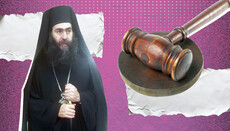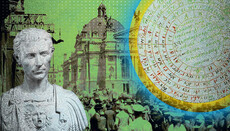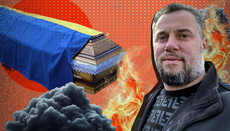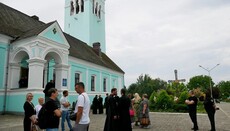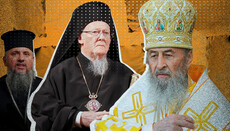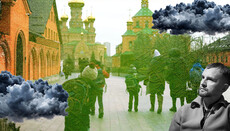"A Ban on the Ukrainian Language" at the Worship Services of the UOC. Another Lie of the "Objective" Media
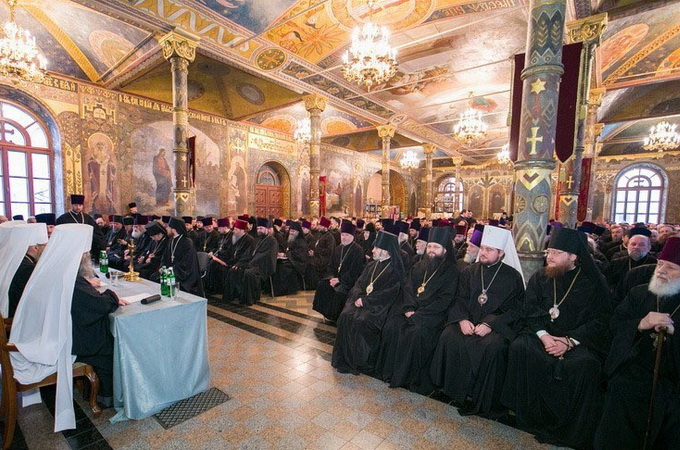
On December 28, a diocesan meeting of the Diocese of the Ukrainian Orthodox Church of Kyiv, chaired by His Beatitude Metropolitan Onuphrius, was held at the Kyiv-Pechersk Lavra. The event drew the attention of mass media, which overview church issues, and was widely and heatedly discussed on Facebook pages by many bloggers and even some pro-European bishops.
All of these publications have a fairly wide emotional register: from mournfully indignant to excitedly joyful. Let's try to sort out this firework of emotions and find out what caused them.
A large majority of publications have been devoted to the mythical persecution, to which Metropolitan Onuphrius allegedly subjected the Ukrainian language in liturgical practice. Having snatched out of context a few phrases of the UOC Primate, "unbiased" Ukrainian journalists and publicists enthusiastically began to interpret them and refute. Exposing headlines like "Metropolitan Onuphrius strongly opposes the Ukrainian language", "The Primate of the Ukrainian Orthodox Church bans the Ukrainian language", "Metropolitan Onuphrіus against Apostle Paul," etc. on pre- New Year and New Year days flooded the Internet.
Traditionally, such resources as "Commander in Chief", "Religion in Ukraine", "Apostrophe", etc. were marked by fake publications. And some "scribblers" even allowed themselves insulting rhetoric against the Primate of the Ukrainian Orthodox Church, as Catherine Shchetkina in her article "Why Metropolitan Onuphrius is at odds with reality."
What was actually said on the "Ukrainian question"? Commenting on the note with a question about the prospects for the introduction of the Ukrainian language in church liturgy Patriarch said: "For us, Ukrainians, the Slavic language is as native as Ukrainian. It's a beautiful, poetic language ... Of course, preaching should be done in a modern language. However, services are held in old languages everywhere: the Greeks serve in Old Greek, Georgians – in Old Georgian, English-speaking people - in Old English. And we serve in Old Slavic, in the language of our ancestors. And we won’t change it. If a person goes to China or Turkey to earn a penny, they learn these respective languages. And in order to earn Salvation they turn out too lazy to learn! "
This quotation lies in the basis of all those scandalous headlines and accusations. Can an adequate person find in these words the information that from December 28, 2015, the Ukrainian language has been prohibited by the UOC? Surely, not. His Beatitude only said that the issue of the language of worship is not expected to undergo any changes, no more than that.
Maybe, Metropolitan Onuphrius is Ukrainophobe and allowed himself to speak out against the state language of Ukraine? Once again, no: he called Ukrainian his mother tongue, "in which he grew up and studied," not to mention the fact that His Beatitude led the diocesan meeting in Ukrainian.
So can it be that in the media space we have people speaking falsehood and capable of slandering a man and the Church, which he heads, for the sake of their own selfish purposes? A simple, although unpleasant, logic dictates it can.
Let’s give a thought to the question why publications are generally written? Obviously, in order to express the author's fact-based point of view on the issue under consideration. If the publication is Church-related, it is logical to assume that the author in one or the other way analyses how well the Church is helping people to fulfill their mission - to improve spiritually and advance towards salvation. But is it really so in publications of many Ukrainian religious journalists?
It is no secret that in recent years a get-together "Witnesses of the local church" has formed in Ukraine, which especially activated after the victory of Euromaidan. Positioning themselves as noble unifiers and consolidators of churches, these people, consisting mainly of religious scholars and journalists of Filaret wing actually are waging an information war against the UOC and this war they do not disdain any methods, including slander and lie.
Not to sound unfounded, I propose to briefly analyse the already mentioned article by one of the most active "writers" of this trend, Catherine Shchetkina, "Why Metropolitan Onuphrius is at odds with reality."
Being a "mastodon" in religious journalism, Shchetkina in the very title reveals her negative attitude to the Primate of the largest Church in Ukraine, bordering with outright rudeness. But let's refrain from jumping to conclusions; maybe Catherine has a reason for such attitude?
The publication, which was positioned as the impressions of the December meeting of the Ukrainian Orthodox Church diocese, in fact was an attempt to discredit His Beatitude Onuphrius, present him in an unfavorable light, and was written, respectively, in ironic and sarcastic tone. Without a single fact capable to somehow denigrate the head of the UOC, to achieve the desired effect on the reader Shchetkina applies all necessary for such cases journalistic arsenal: quotes, complex emotional structures, as well as "all the sarcasm given by God."
According to the journalist "extreme opposition to" schismatics ", the belief ... that the Church is a model institution" is not normal and almost obscene for the Primate of the Church. The author was hurt by the words of His Beatitude that "it is necessary to understand faith by "heart ", adding to it "and not by other parts." Personally I was bewildered by this phrase by Shchetkina, I even don’t dare to ask Catherine by what part of her body she understands faith?
The "language issue" did not pass his attention as well - according to the publicist church-Slavic language of worship "is not understandable". Well, probably a religious journalist Shchetkina doesn’t attend worship and, respectively, finds it difficult to understand the language of worship of several Orthodox Churches in the world. Well, as they say in one popular joke: "A Chukchi is not a reader – a Chukchi is a writer."
But the main technique of writing the article is definitely using quotes.
As you know, any information which is not a quote, being placed in quotation marks, according to the authors, loses its original meaning and obtains the opposite one. That is the "schismatics" are actually not schismatics, "an exemplary monk" is not so exemplary, a "man of prayer" is generally not clear who. Most often Ms. Shchetkina used a quoted expression "a perfect monk" – four times.
In such a way the author sort of hints to the reader, even dos not hint but shouts to the reader: "No, Metropolitan Onuphrius is not that perfect, but very bad!" Apparently, the journalist did not read the opinions of bishops of the three Orthodox Churches about His Beatitude, where the words of a representative of one of the most authoritative world churches – Greek - sound pretty impressive: "If only we had such a Primate in Greece! " Though I admit that for such a serious professional as Shchetkina hierarchs of world Orthodoxy are not authority.
However, the fact that Metropolitan Onuphrius is a monk, Catherine does not deny. So far so good! But as it turns out "a perfect monk" does not mean "a perfect head of the Church." And indeed, the fact that the head of the Church is not a layman but a monk sounds outrageous for Ms. Shchetkina.
Journalist genuinely worry about the fate of the unfortunate gullible Ukrainians, who are oppressed and hurt by evil monks: "Any secular Christians - this applies even to the clerics, to say nothing of the laity - are "second-rate" Christians compared to the monastic monks ... - legislators of ecclesiastical lifestyle, the minority, who defines the rules for the majority. By law of the "purity of life" - the rule that, in fact, they themselves made up, but which mustn’t be questioned."
In the end, the religious journalist went too far following her female logic - she uncovered a conspiracy of monks who do not want to give the reins of the Church in the wise hands of the laity: "... as a result, formed a specifically" monastic "pride and the desire to maintain their authority in the community of the faithful, called "the Church "in all its fullness." And this "stream of consciousness" is written by the author of more than 340 publications on Orthodox issue!
The article by Ms. Shchetkina ends no less originally – in the author’s unhealthy view "the head of the church is a political, not a monastic position. And a politician disregarding the reality is an easy prey for all sorts of manipulators. "
However, in some way the author is right. The history of our Church is almost 2,000 years. And if the church hierarchy listened to ill fantasies of such personalities as Shchetkina, living in their alternative reality, the Church would inevitably be a prey for "all sorts of manipulators."
Metropolitan Innocent of Beijing and China (1863-1931) in his "Open Letter to all the faithful children of the Church of Christ, holding on the Orthodox calendar and the traditions of the Holy Orthodox Catholic Church" wrote: "There is nothing low-value, nothing unimportant in the Church of Christ, because each custom embodies the spirit God, which the Church lives and breathes in. Anyone who dares to rise up against the customs and laws of the Church, based on Sacred Scripture and Tradition, rebels against the Spirit of God and in doing so reveals to all who have eyes what his spirit is".
